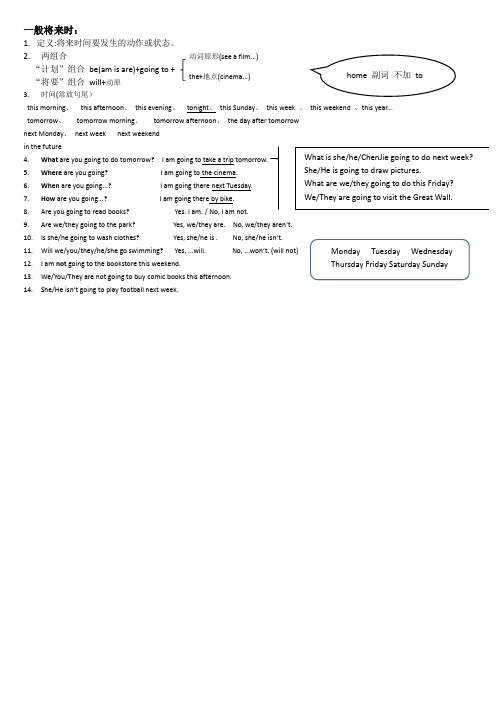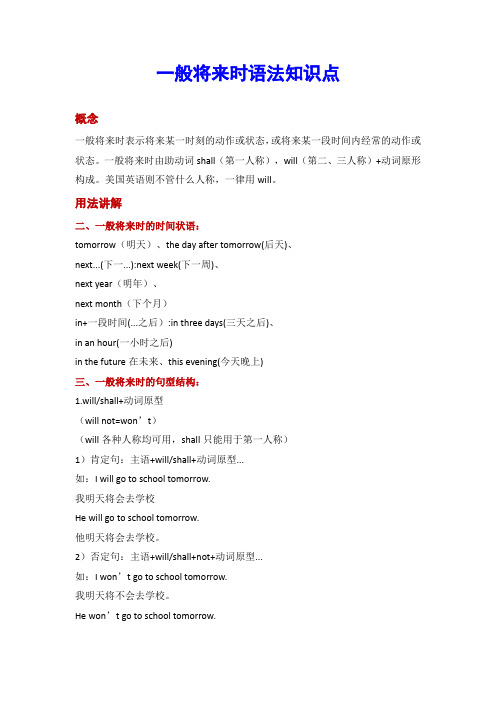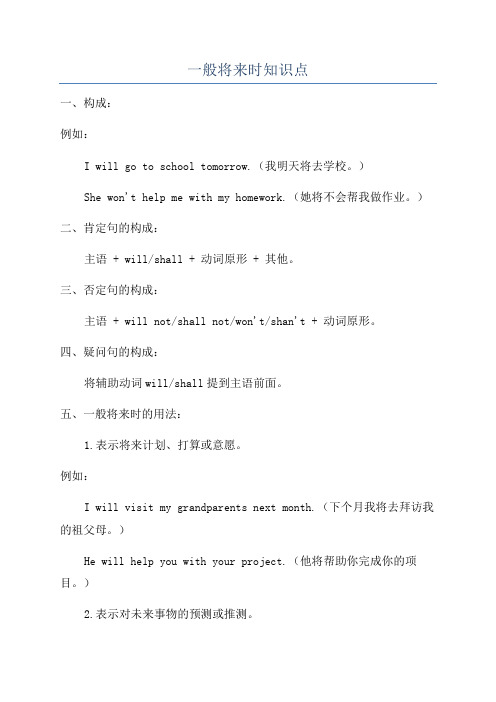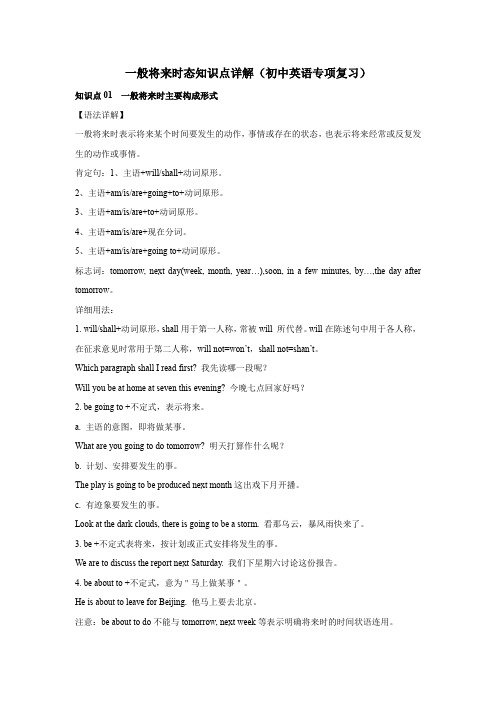一般将来时知识点
一般将来时 知识点

一般将来时:1. 定义:将来时间要发生的动作或状态。
2. 两组合 “计划”组合 be(am is are)+going to + “将要”组合 will+动原3. 时间(常放句尾) this morning 、 this afternoon 、 this evening 、 tonight 、 this Sunday 、 this week 、 this weekend 、this year... tomorrow 、 tomorrow morning 、 tomorrow afternoon 、 the day after tomorrownext Monday 、 next week next weekendin the future4.What are you going to do tomorrow?I am going to take a trip tomorrow. 5.Where are you going?I am going to the cinema. 6.When are you going...? I am going there next Tuesday. 7.How are you going...? I am going there by bike. 8.Are you going to read books? Yes. I am. / No, I am not. 9. Are we/they going to the park? Yes, we/they are. No, we/they aren ’t. 10. Is she/he going to wash clothes? Yes, she/he is . No, she/he isn ’t.11. Will we/you/they/he/she go swimming? Yes, ...will. No, ...won ’t. (will not)12. I am not going to the bookstore this weekend.13. We/You/They are not going to buy comic books this afternoon.14. She/He isn ’t going to play football next week. 动词原形(see a film...)the+地点(cinema...)。
高中英语一般将来时知识点总结

高中英语一般将来时知识点总结高中英语一般将来时知识11.1 一般将来时的构成肯定句:主语 + shall/will + 动词原形...否定句:主语 + shall/will + not + 动词原形...疑问句:Shall/Will + 主语 + 动词原形...?疑问代词/疑问副词 + shall/will + 主语 + 动词原形...?1.2 一般将来时的肯定句句型:主语 + shall/will + 动词原形....在书面语中,如果主语是第一人称,常用“助动词shall + 动词原形”构成一般将来时的肯定句,即“I/we + shall + 动词原形”;shall可缩写为'll:If I have time tomorrow,I think I'll get a haircut.如果我明天有时间,我想去理个发在口语中,所有的人称都可以用will,即“主语(所有人称) + will + 动词原形...”;will可缩写为'll:Some day,I'll tell you.将来某一天我会告诉你的。
1.3 一般将来时的否定句句型:主语 + will/shall + not + 动词原形...一般将来时的否定句是在will/shall后加not;will not可缩写为won't;shall not可缩写为shan't:Mary won't go to the party.玛丽不会去参加晚会。
1.4 一般将来时的一般疑问句句型:Shall/Will + 主语 + 动词原形...回答方式:Yes,主语 + shall/will.No,主语 + shall/will + not.一般将来时的一般疑问句是将助动词shall/will置于主语之前(大写shall/will的第一个字母),在句尾加问号;这种语序是主语和谓语倒装语序:Will he come? 他来吗?Will you be at our next meeting? 我们下次开会你来吗?Will you be free tonight? —Yes,I will./No,I won't(be free).今晚你有空吗? ——是,我有空。
一般将来时语法知识点

一般将来时语法知识点概念一般将来时表示将来某一时刻的动作或状态,或将来某一段时间内经常的动作或状态。
一般将来时由助动词shall(第一人称),will(第二、三人称)+动词原形构成。
美国英语则不管什么人称,一律用will。
用法讲解二、一般将来时的时间状语:tomorrow(明天)、the day after tomorrow(后天)、next...(下一...):next week(下一周)、next year(明年)、next month(下个月)in+一段时间(...之后):in three days(三天之后)、in an hour(一小时之后)in the future在未来、this evening(今天晚上)三、一般将来时的句型结构:1.will/shall+动词原型(will not=won’t)(will各种人称均可用,shall只能用于第一人称)1)肯定句:主语+will/shall+动词原型...如:I will go to school tomorrow.我明天将会去学校He will go to school tomorrow.他明天将会去学校。
2)否定句:主语+will/shall+not+动词原型...如:I won’t go to school tomorrow.我明天将不会去学校。
He won’t go to school tomorrow.他明天将不会去学校。
3)一般疑问句:Will/Shall+主语+动词原型...如:Will you go to school tomorrow?你明天要去学校吗?Will he go to school tomorrow?他明天要去学校吗?肯定回答:Yes,主语+will.如:Yes,I will.Yes,he will.否定回答:No,主语+will+not.如:No,I won’t.No,he won’t.4)特殊疑问句:特殊疑问词+will/shall+主语+动词原型... 如:What will you do tomorrow?你明天将会做什么?What will he do tomorrow?他明天将会做什么?2.be going to+动词原型1)肯定句:主语+be going to+动词原型...如:I am going to buy some books tomorrow.我明天打算去买一些书。
一般将来时知识点

一般将来时知识点一、构成:例如:I will go to school tomorrow.(我明天将去学校。
)She won't help me with my homework.(她将不会帮我做作业。
)二、肯定句的构成:主语 + will/shall + 动词原形 + 其他。
三、否定句的构成:主语 + will not/shall not/won't/shan't + 动词原形。
四、疑问句的构成:将辅助动词will/shall提到主语前面。
五、一般将来时的用法:1.表示将来计划、打算或意愿。
例如:I will visit my grandparents next month.(下个月我将去拜访我的祖父母。
)He will help you with your project.(他将帮助你完成你的项目。
)2.表示对未来事物的预测或推测。
例如:It will rain tomorrow.(明天将会下雨。
)3.表示对将来事件的承诺或约定。
例如:They won't be late for the meeting.(他们不会迟到参加会议。
)4.表示习惯性、定期发生的动作或存在的状态。
例如:He will always watch TV after dinner.(他晚饭后经常看电视。
)They will be in Shanghai next week.(下周他们将在上海。
)5.用于条件句中,表示对未来情况的假设。
例如:If it rains tomorrow, we won't go hiking.(如果明天下雨,我们不会去远足。
)6.用于请求、建议、命令等语气中。
例如:Will you close the window?(请你关上窗户好吗?)You should study harder.(你应该更加努力学习。
)六、一般将来时的时间状语:表示将来的时间状语有:tomorrow(明天)、next week(下周)、in the future(将来)、soon(很快)、later(后来)、next year(明年)等。
一般将来时知识点

一般将来时知识点一般将来时是英语中用来表达将来时间的一种时态。
在本文中,我们将介绍一般将来时的基本用法和相关的注意事项。
1. 用法一般将来时表示将来某个时间会发生的动作或存在的状态。
通常使用以下方式构成一般将来时:- 使用助动词 "will" + 动词原形,例如:I will go to the cinema tomorrow.- 使用 "be going to" + 动词原形,例如:She is going to take a vacation next month.2. 表示计划和打算一般将来时经常用于表达计划和打算。
当我们准备做一些与未来有关的事情时,可以使用一般将来时来表达我们的意图。
例如:- I will visit my grandparents this weekend.- She is going to study abroad next year.3. 表示预测和预见一般将来时还可以用于表示对未来事件的预测和推测。
我们可以根据目前的情况和证据来作出合理的预测。
例如:- It will rain tomorrow. (天气预报)- I think she will become a successful writer in the future. (个人观点)4. 表示意愿和承诺一般将来时还可以用来表示意愿和承诺。
当我们想要表达我们的意愿或者向别人做出承诺时,可以使用一般将来时来表达。
例如:- I will help you with your homework.- They are going to donate money to charity.5. 注意事项在使用一般将来时时,我们需要注意以下几点:- 在第一人称和第二人称中,"will" 和 "be going to" 是可以互换使用的。
例如:I will / am going to buy a new car.- 在第三人称中,"will" 和 "be going to" 有细微的区别。
一般将来时PPT课件

•一般将来时基本概念•一般将来时结构与用法•一般将来时时间状语及标志词•一般将来时与其他时态对比•一般将来时在各类从句中运用•一般将来时误区及注意事项•总结回顾与拓展延伸目录01一般将来时基本概念定义与特点定义特点表现形式will + 动词原形be going to + 动词原形现在进行时表示将来预测未来计划与安排条件与假设030201使用场景02一般将来时结构与用法主语+ be not going to + 动词原形+ 其他成分主语+ be to not (非标准用法,尽量避免使用) + 动词原形+ 其他成分主语+ will not (won't) + 动词原形+ 其他成分Will + 主语+ 动词原形+ 其他成分?Be + 主语+ going to + 动词原形+ 其他成分?Be + 主语+ to + 动词原形+其他成分?(较少使用,多用于书面语)特殊疑问词动词原形特殊疑问词going to +成分?特殊疑问词to +(较少使用,多用于书面语)注意:在一般将来时的使用中,要注意区分不同语境和表达方式的细微差别,选择合适的结构进行表达。
同时,也要注意与其他时态的区分和联系,避免混淆使用。
特殊疑问句结构03一般将来时时间状语及标志词常见时间状语表示将来的时间状语表示计划或安排的时间状语标志词识别与运用04一般将来时与其他时态对比与现在进行时对比时间指向不同01动词形式差异02使用情境不同03时间基准差异动词形式变化使用情境区别时间范围不同动词形式区别使用情境差异05一般将来时在各类从句中运用在宾语从句中运用01 02定语从句的时态取决于它所修饰的先行词,如果先行词是将来时态,定语从句也使用将来时态。
如果先行词是过去将来时,定语从句则使用过去将来时。
定语从句中表示将来的时间状语有:tomorrow, next year, in the future 等。
06一般将来时误区及注意事项误区二过度使用“will”和“going to”。
一般将来时知识点

明思教育牛津英语7B 英语语法 (三 )一般未来时一、一般未来的形式一般未来表示未来某个将要生的作或存在的状,也表示未来常或屡次生的作。
一般未来由助shall 或 will加原形构成, shall 用于第一人称, will用于第二、三人称。
但是在第一人称一般也用will ,其区其实不明。
(或“ be going to+原形)常与tomorrow, next⋯ , in( the ) future, soon, in five days, in two weeks 等用。
如: I shall not come if it rains tomorrow.如明天下雨我就不来。
My father will leave for China next week.我的爸爸下星期要到中国去。
“I ’ll, You ’ll, He ’ll , She’ll , It’ll, We ’ll , They’ll ⋯”是形式。
二.一般未来的句型1.必定句:主 +shall /will++其他成份The workers will build a new school here next year.工人明年将在儿盖一所新学校。
They will go shopping this afternoon.今天下午他将要去物。
We shall have a delicious dinner tonight.今晚我将美餐一。
We shall be there before dark.我天黑前会到达那处。
2.否定句:主 +shall /will+not++其他成份She won’t come back this week.一周她不回来了。
I will not go shopping one hour later.一小此后我不会去物。
He won’t play football with you before he finishes his work.他干完活后才能跟你踢足球。
一般将来时态知识点详解(初中英语专项复习) (4)

一般将来时态知识点详解(初中英语专项复习)知识点01 一般将来时主要构成形式【语法详解】一般将来时表示将来某个时间要发生的动作,事情或存在的状态,也表示将来经常或反复发生的动作或事情。
肯定句:1、主语+will/shall+动词原形。
2、主语+am/is/are+going+to+动词原形。
3、主语+am/is/are+to+动词原形。
4、主语+am/is/are+现在分词。
5、主语+am/is/are+going to+动词原形。
标志词:tomorrow, next day(week, month, year…),soon, in a few minutes, by…,the day after tomorrow。
详细用法:1. will/shall+动词原形,shall用于第一人称,常被will 所代替。
will在陈述句中用于各人称,在征求意见时常用于第二人称,will not=won’t,shall not=shan’t。
Which paragraph shall I read first? 我先读哪一段呢?Will you be at home at seven this evening? 今晚七点回家好吗?2. be going to +不定式,表示将来。
a. 主语的意图,即将做某事。
What are you going to do tomorrow? 明天打算作什么呢?b. 计划、安排要发生的事。
The play is going to be produced next month这出戏下月开播。
c. 有迹象要发生的事。
Look at the dark clouds, there is going to be a storm. 看那乌云,暴风雨快来了。
3. be +不定式表将来,按计划或正式安排将发生的事。
We are to discuss the report next Saturday. 我们下星期六讨论这份报告。
- 1、下载文档前请自行甄别文档内容的完整性,平台不提供额外的编辑、内容补充、找答案等附加服务。
- 2、"仅部分预览"的文档,不可在线预览部分如存在完整性等问题,可反馈申请退款(可完整预览的文档不适用该条件!)。
- 3、如文档侵犯您的权益,请联系客服反馈,我们会尽快为您处理(人工客服工作时间:9:00-18:30)。
一般将来时主要有以下几种表现形式:由助动词shall或will加动词原形构成,shall 用于第一人称,will用于第二、三人称。
除英国外的说英语的国家,在陈述句中,即使在第一人称一般也用will,在英国也有这种趋势。
在口语中,常用shall, will的缩写形式为’ll, 如:I’ll, you’ll等。
Shall not的缩写式为:shan’t, will not 的缩写式为:won’t.肯定句:I/We shall/will go.You/He/She/They Will go.否定句:I/We shall/will not go.You/He/She/They Will not go.疑问句:Shall I/we go?Will you/he/she/they go?什么叫做一般将来时(1)一般将来时表示将要发生的动作或情况。
例如:I will(shall) arrive tomorrow.我明天到。
Will you be free tonight? 你今晚有空吗?We won’t (shan’t) be busy this evening. 我们今晚不忙。
(2)在一般将来时的句子中,有时有表示将来时间的状语,有时没有时间状语,这时要从意思上判断是否指未来的动作或情况。
例如:Will she come? 她(会)来吗?We’ll only stay for two weeks. 我们只待两星期。
The meeting won’t last long. 会开不了多久。
(3)在以第一人称I或we作主语的问句中,一般使用助动词shall,这时或是征求对方的意见(a),或是询问一个情况(b):a. Where shall we meet? 我们在哪儿碰头?b. Shall we have any classes tomorrow?明天我们有课吗?在这类问句中,近年来也有不少人用will,特别是在美国。
例如:How will I get there? 我怎么去?(4)be going to+动词原形a.表示打算、准备做的事。
例如:We are going to put up a building here.我们打算在这里盖一座楼。
How are you going to spend your holidays?假期你准备怎样过?b.表示即将发生或肯定要发生的事。
例如:I think it is going to snow. 我看要下雪了。
There’s going to be a lot of trouble about this. 这事肯定会有很多麻烦。
c.“will”句型与“be going to”句型,前者表示纯粹将来,后者表示打算、计划、准备做的事情,更强调主语的主观意愿。
例如:Tomorrow will be Saturday. 明天是周六了。
We are going to visit Paris this summer.今年夏天我们打算游览巴黎。
一般将来时就是指将来发生的事情或者没有发生可能发生的事情也能是自己主观的意志问题比如i will。
等等就是一定是没有发生的明思教育牛津英语7B英语语法(三)一般将来时一、一般将来时的动词形式一般将来时表示将来某个时间将要发生的动作或存在的状态,也表示将来经常或反复发生的动作。
一般将来时由助动词shall或will加动词原形构成,shall用于第一人称,will用于第二、三人称。
但是现在第一人称一般也用will,其区别并不明显。
(或“be going to + 动词原形)常与tomorrow, next…, in (the)future,soon, in five days,in two weeks等连用。
如: I shall not come if it rains tomorrow.如明天下雨我就不来。
My father will leave for China next week.我的爸爸下星期要到中国去。
“I’ll,You’ll,He’ll, She’ll, It’ll,We’ll, They’ll…”是简缩形式。
二.一般将来时的句型1.肯定句:主语+shall /will+动词+其他成份The workers will build a new school here next year.工人们明年将在这儿盖一所新学校。
They will go shopping this afternoon.今天下午他们将要去购物。
We shall have a delicious dinner tonight.今晚我们将美餐一顿。
We shall be there before dark.我们天黑前会到达那里。
2.否定句:主语+shall /will+not+动词+其他成份She won’t come back this week.这一周她不回来了。
I will not go shopping one hour later.一小时之后我不会去购物。
He won’t play football with you before he finishes his work. 他干完活后才能跟你踢足球。
3.疑问句:shall /will+主语+动词+其他成份Will you be back in ten minutes?十分钟后你会回来吗?Will you please open the window?请你打开窗户好吗?Shall we get something hot to drink?我们喝一些热饮怎么样?4.特殊疑问句:特殊疑问词+shall /will+主语+动词+其他成份Where will you go next week? 下星期你去哪?What shall I do?我怎么办呢?How many books will they get? 他们将有多少本书?三.Will, be going to …,be to…,be about to…的区别1.be going to +不定式,表示将来。
表示打算、准备做的事或即将发生或肯定要发生的事。
be going to和will相比,be going to通常表示主观,will通常表示客观。
What are you going to do tomorrow? 明天你要做什么?Look at the dark clouds, there is going to be a storm. 看看这些黑云,将有一场暴风雨。
It’s going to be a fine day tomorrow.明天将会是个好天。
It is going to rain. 要下雨了。
2.“be to+动词原形”表示按计划要发生的事或征求对方意见。
这种结构表示计划中约定的或按职责、义务要求必须去做的事或即将发生的动作。
We are to have a meeting next Saturday. 下个周日我们有个会。
The boy is to go to school tomorrow. 这个男孩明天要去上学。
Are we to go on with this work? 我们继续干吗?The president is to visit China next week.总统下周来访中国。
3.“be about to+动词原形”表示即将发生的动作,意为:很快,马上。
后面一般不跟时间状语。
这一结构用于表示客观就要发生的事,表示马上就要发生。
一般不再与时间状语连用。
Don’t go out. We’re about to have a meeting. 别出去了,我们很快就开会了。
I was about to start when it began to rain.我刚要出发就下起雨来了。
He is about to leave for Shenyang.他将要离开去沈阳。
We are about to leave. 我们马上就走。
The film is about to begin. 电影马上就要开始了。
四一般现在时表将来1)下列动词come, go, arrive, leave, start, begin, return的一般现在时可以表示将来,主要用来表示在时间上已确定或安排好的事情。
例如:The train leaves at six tomorrow morning. 火车明天上午六点开。
When does the bus star? It stars in ten minutes. 汽车什么时候开?十分钟后。
2)以here, there等开始的倒装句,表示动作正在进行。
例如:Here comes the bus. = The bus is coming. 车来了。
There goes the bell. = The bell is ringing. 铃响了。
3)在时间或条件句中。
例如:When Bill comes (不是will come), ask him to wait for me. 比尔来后,让他等我。
I'll write to you as soon as I arrive there. 我到了那里,就写信给你。
4)在动词hope, take care that, make sure that等的宾语从句中。
例如:I hope they have a nice time next week.我希望他们下星期玩得开心。
Make sure that the windows are closed before you leave the room.离开房间前,务必把窗户关了。
五.用现在进行时表示将来下列动词come, go, arrive, leave, start, begin, return等现在进行时可以表示将来。
例如:I'm leaving tomorrow.明天我要走了。
Are you staying here till next week?你会在这儿呆到下周吗?六.注意事项1. be about to 不能与tomorrow, next week 等表示明确将来时的时间状语连用。
2. Let’s…的附加疑问通常使用“…,shall we ?”。
Let’s have a rest, shall we?3. 问句是“Shall…?”,答句就用“shall~”;问句用“Will…?”,答句就用“will~ ”。
要前后保持一致。
---精心整理,希望对您有所帮助。
